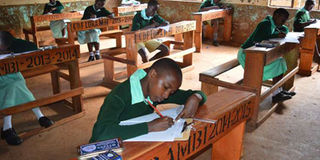State should ensure that all pupils stay in school until they reach 18

Kakamega Primary School candidates sit for their KCPE 2015 Mathematics paper on November 10, 2015. The last time I thought about KCPE examination results with anything close to personal interest was seven years ago when my last-born sat her papers. PHOTO | ISAAC WALE | NATION MEDIA GROUP
What you need to know:
- But according to reports, out of the 937,000 pupils who sat for the KCPE examination, only 700,000 will be absorbed by public secondary schools, while private schools will absorb another 105,000.
- Those who argue that reviewing the 8-4-4 system to make children stay longer in primary school will make a difference may have a point, but I do not see it.
- Losing thousands of youths every year will surely become a lot more costly for the country in the long run! This is a waste we can’t afford.
The process of selecting primary school leavers who will join secondary schools is fast approaching, and by January 21, they will know their fate.
But according to reports, out of the 937,000 pupils who sat for the KCPE examination, only 700,000 will be absorbed by public secondary schools, while private schools will absorb another 105,000.
The fate of the rest who could not make it has not, to my knowledge, been addressed.
The last time I thought about KCPE examination results with anything close to personal interest was seven years ago when my last-born sat her papers.
But the matter came back with some force a week ago when my neighbour’s child, a boy who had been performing well all through his primary school years under very adverse conditions, failed to attain a good grade, and his hopes of being admitted to a national school were crushed.
But at least the crestfallen chap is likely to get a slot in a secondary school of one sort or the other, and he has a chance to rise from the ashes of despair.
And though he may not know it, a similar opportunity will not be available to more than 130,000 of his age-mates, for they will be tossed by the wayside by a heartless system that shows little empathy for those who fail.
This happens practically every year, especially since basic education became free and compulsory.
It is a heart-rending story that always elicits thoughtful comments and grand plans about how to reform the system to ensure that as many youngsters as possible are not forced out of school when they are too young to fend for themselves.
STUDY UP TO FORTH FORM
Can someone tell me what a 14-year-old is supposed to do if the grade he or she attains at the primary level is not good enough for admission to secondary school?
Some of them do not even have the capacity to appreciate the importance of education in their lives, and they know very little of anything remotely useful.
That is why many people are starting to agree with those who argue that the KCPE exam has become absolutely useless as a gauge of whether a child will succeed or fail in life.
Eight years of basic education is simply not a good indicator of whether a child is a congenital idiot or whether, given a chance, he or she can overcome the numerous challenges of early life and excel academically.
Those who argue that reviewing the 8-4-4 system to make children stay longer in primary school will make a difference may have a point, but I do not see it.
Those who say that getting rid of the KCPE exam altogether will on its own improve the education system may also have a point, but I don’t see it either.
However, I heartily agree with those who insist that children should not have to drop out of school until they are at least 18 years, an age when they can do something useful with their heads or hands.
This, in short, means that until they attain a certain maturity, administering exams like the KCPE to our children will be pointless.
Only after Form Four will it become clear whether someone has what it takes to go on with education or whether vocational training in polytechnics or other middle-level institutions is called for.
Since I am neither an academician nor an educational planner, I won’t deign to offer solutions.
A PERVERTED SYSTEM
In any case, many studies already carried out by prominent educationists and solutions to this ridiculous winnowing system have done so in many a learned paper, and there would be no use for a layman to suggest one more.
What is obvious is that it is not the current system which produces such anomalies; it is the attitude of educational authorities who believe that trying out something new will either be too disruptive or too expensive. But this need not be.
How, for instance, would it be expensive to allow students to proceed with education up to Form Four and then administer one definitive examination so that those who qualify for university education can go ahead and those who do not can seek alternatives?
Losing thousands of youths every year will surely become a lot more costly for the country in the long run! This is a waste we can’t afford.





